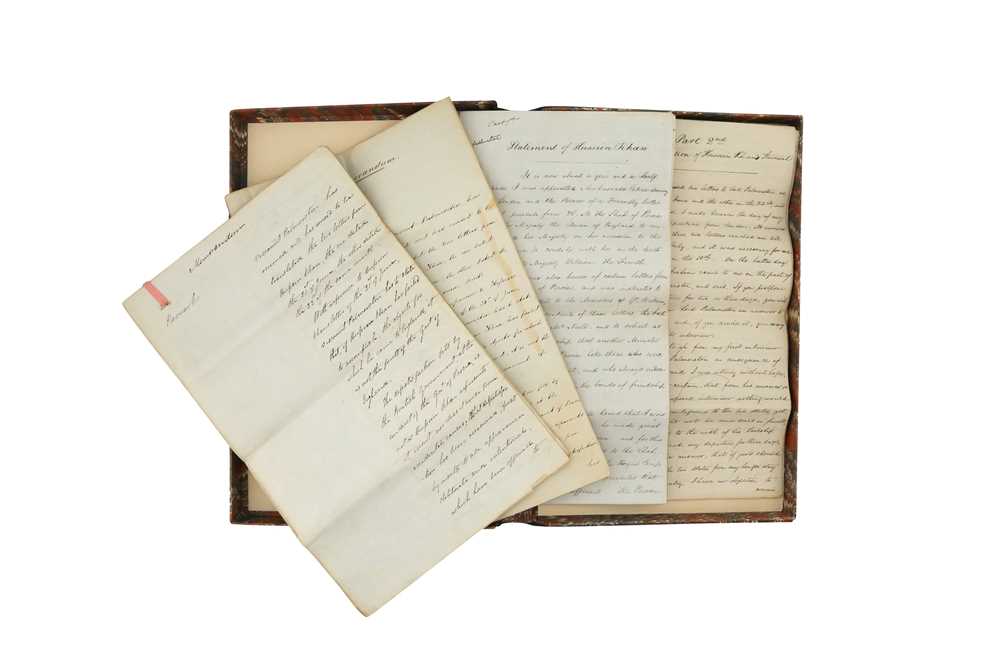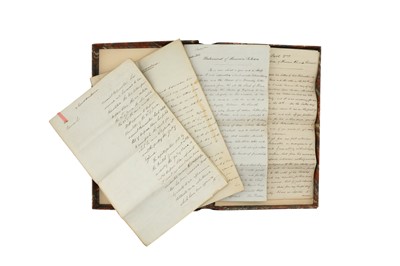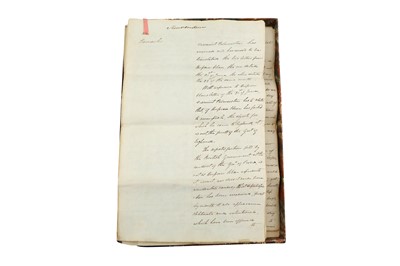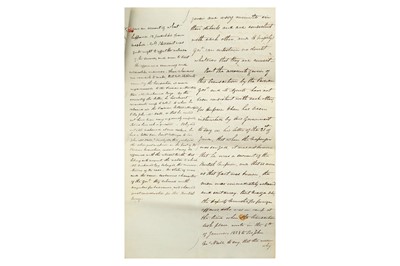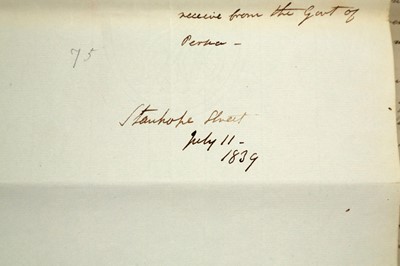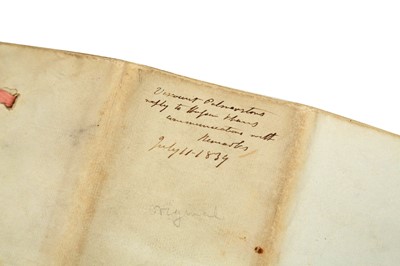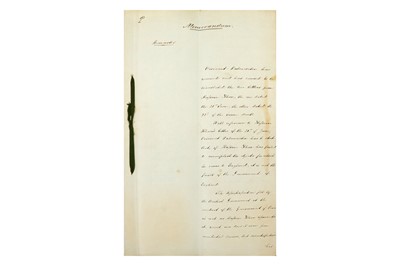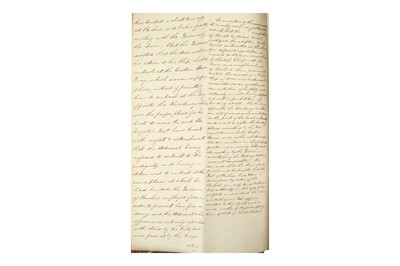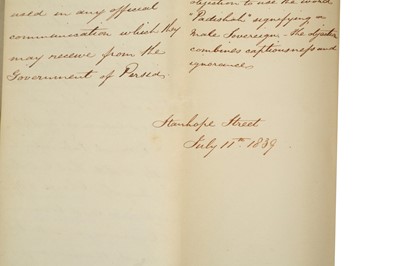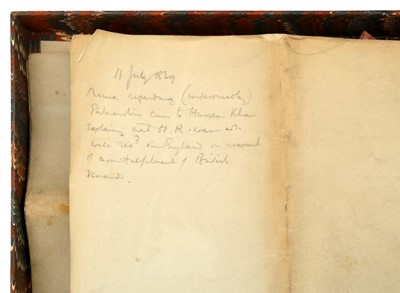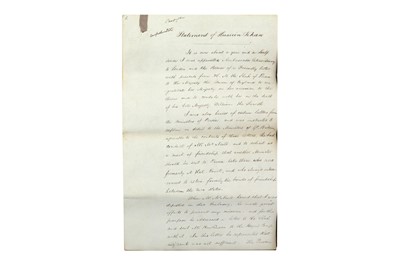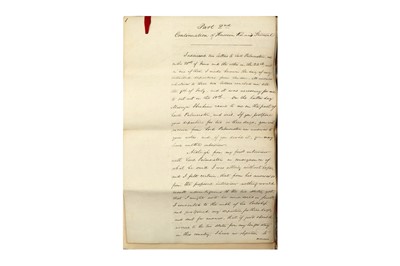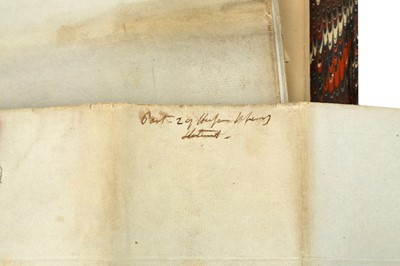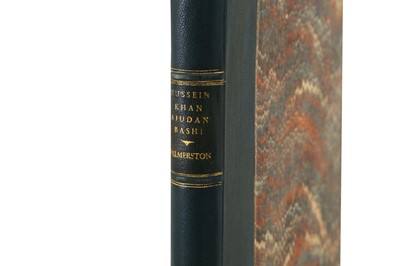28th Oct, 2022 14:00
Islamic & Indian Art
MEMORANDA AND STATEMENTS: IMPORTANT DOCUMENTS RELATED TO THE ANGLO-PERSIAN CONFLICT OVER HERAT
London, England, dated 1839
MEMORANDA AND STATEMENTS: IMPORTANT DOCUMENTARY CORRESPONDENCE BETWEEN HUSSEIN KHAN MOGHADAM MARAGHEH NIZAM AL-DOWLEH AJUDAN BASHI, THE PERSIAN AMBASSADOR TO GREAT BRITAIN, AND LORD PALMERSTON, THE BRITISH FOREIGN SECRETARY, 1838-1840
PROPERTY FROM A PRIVATE ENGLISH BIBLIOPHILE
London, England, dated 1839
English manuscripts in sepia ink on lined and watermarked pale blue paper, 116ff. presenting various paper watermarks including J Gater 1837 and Britannia within an oval surmounted by a crown, each marked and dated Stanhope Street July 11, 1839, Palmerston’s copy of Hussein Khan’s statement divided into two parts in a secretarial hand and translated in English, and Palmerston’s copy of his own memorandum also divided into two parts, the first part in Palmerston’s own hand (as verified with a comparison with the Palmerston papers at the Public Record Office) and presenting copious remarks written in a secretarial hand in the left-hand column of both parts of the memorandum, both documents on similar British government stationary, in marbled paper document holder box, the spine in dark green calf stamped Hussein Khan Ajudan Bashi Palmerston, the folios 32.2cm x 20.7cm, the box 34.2cm x 23.5cm.
Provenance: Sotheby’s London, 12 - 13 October 2000, lot 335.
Lord Palmerston (Henry John Temple, 3rd Viscount Palmerston) (1784-1865) was a British diplomat with a long government career. He served for many years as British Foreign Secretary (1830–34, 1835–41, and 1846–51) and Prime Minister (1855–58 and 1859–65). In his approach, he was a British nationalist with a pragmatic outlook who did not believe in having permanent allies, only permanent interests. With respect to his foreign policy on Central Asia and Persia, Palmerston was primarily concerned with communications threats with India and aimed at the containment of Russia. Though Britain and Russia cooperated in the Persian succession in 1834, Palmerston remained suspicious of Russian intentions and believed that their representatives were pressing the Shah to renew his attack on the strategic Afghan fortress of Herat.
John McNeill (1795-1883) was another British diplomat heavily involved in 19th-century Anglo-Persian relations, the subject of the present lot. A doctor by education, he was appointed assistant surgeon on the East India Company’s Bombay establishment in 1816. In 1836, he retired from the medical service and was appointed envoy and minister plenipotentiary to the newly-proclaimed Shah of Persia, Muhammad Shah Qajar (r. 1834 - 1848). The disastrous Herat campaign (1837 - 1838) made him a persona non grata at the Qajar court, as the present documents attest. In 1841, a treaty of commerce was concluded between Great Britain and Persia, which brought McNeill’s direct involvement with Persia to an end.
The rivalry among the British, the Russians, and Iran over the control of Herat, and Afghanistan in general, is amply documented. The present letters act as witnesses of the high degree of interference the British would employ to protect Herat, their gateway to India.
After the public humiliation, loss of strategic territories, and conspicuous reparations paid to Russia after the Treaty of Turkmenchay, which concluded the Russo-Persian War (1826–28), Fath Ali Shah, Abbas Mirza, and later on, Mohammad Shah all viewed the recapture of Herat as a means to re-establish Persian honour and prestige. For centuries, Herat was regarded as an integral territory under Persian suzerainty, which explains why soon after his accession to the throne in 1834, Mohammad Shah focused his attention on its re-annexation. This evidently clashed with both Britain's and Russia's views, both hoping to detain power over this strategic stronghold. The British government, headed by Lord Palmerston as Foreign Secretary, viewed with alarm the growing Russian influence in Tehran and perceived Iran's attempt to regain control of Herat as a Russian move to foment tribal anti-British agitation in Afghanistan.
In July 1837, Mohammad Shah ordered a troop assembly, and in September of the same year, he marched towards Herat at the head of sizeable regular and tribal forces joint together. John McNeill, the British Envoy and Minister Plenipotentiary to Persia appointed in 1836, warned the Qajar Shah of British retaliation and ensured Herat put up a strong defence against the Persian advances. The Qajar troops remained stranded before Herat’s gates for nearly ten months; their artillery proved ineffective, and the siege strategy failed to gain them access to the fortifications of Herat. In April 1838, McNeill decided to personally visit the Qajar camp threatening further British military retaliation and attempting to put pressure on the Shah to accept his mediation. However, the Shah was clearly unimpressed by British threats and pursued his scope. Such action led to a break in Anglo-Persian diplomatic relations on 7 June 1838 and the occupation of the Persian Gulf island of Kharg by the British Indian fleet ten days later. In August 1838, troop exhaustion and the high cost of the war forced the Shah to accept McNeill’s earlier offer and thus, return to Tehran empty-handed in September of the same year, a year after his march towards Herat.
The bitter taste of failure worsened the Shah and McNeill's relations. It wasn't long before Mohammad Shah sent Hussein Khan Ajudan Bashi as special envoy to London to make representations against the British Minister Plenipotentiary. The Persian ambassador's translated letter in the present lot seeks on behalf of the Persian crown the removal of John McNeill. Rather than respecting the diplomatic protocol regarding the receipt of an envoy’s credentials, being the gift of the host government, the Persian request is refuted by Lord Palmerston’s response memoranda. Playing deaf to Iran's requests, the British Foreign Secretary instead added nine new conditions for Iran to adhere to in order to prevent retaliation. The whole affair signified a humiliating setback for Qajar Iran and a clear British strategic victory over Russian advances in Central Asia. Our important documents testify to the British ruthless and aggressive attitude towards foreign politics in the Middle East in the early to mid-19th century, and Lord Palmerston's treatment of a sovereign country with so little regard declares a certain degree of hubris. The reverberations of such attitudes continue to be keenly felt, and colour Anglo-Persian relations to this very day.
Do you have an item similar to the item above? If so please click the link below to submit a free online valuation request through our website.
